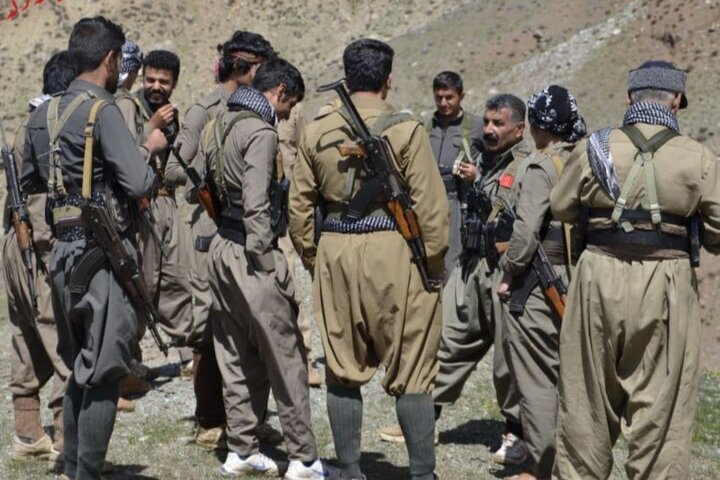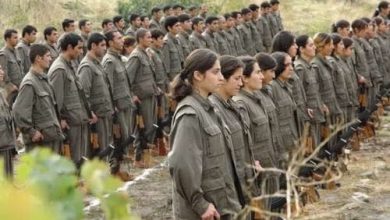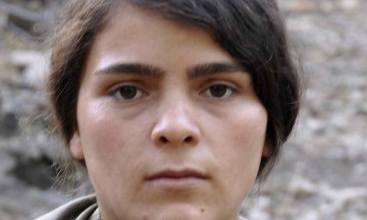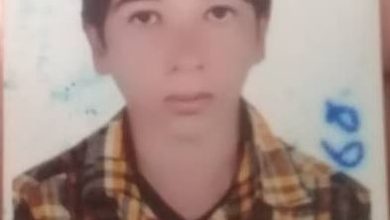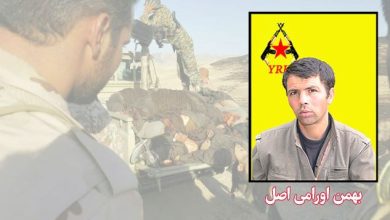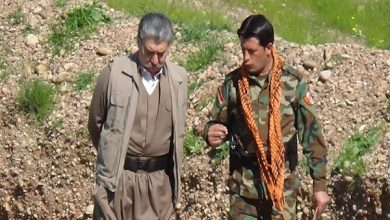Rasoul Sayadi, a young man from Qasr-e Shirin, is known for a life filled with hardship and bitter experiences. After dropping out of high school and struggling with addiction, he eventually found himself entangled with armed groups. His life story provides a raw look into the fate of many young Kurds who fall victim to social conditions, poverty, and the deception of these groups.
Rasoul Sayadi, born in 1996 in Qasr-e Shirin, only completed his first year of high school. A severe addiction to drugs and various family problems led him to meet a man named Saman Javanroudi on Instagram. At the time, Rasoul had also met and fallen in love with a girl named Ronak Pahlevanikia, but their families were completely against their marriage due to their shared addiction.
Saman initially made no mention of the PAK (Kurdistan Freedom Party) group or its membership. However, after learning about Rasoul’s personal issues, he told him that a camp existed in the Kurdistan Region for Iranian Kurds. He claimed that through this camp, Rasoul and his girlfriend could seek asylum and eventually travel to Europe.
Rasoul claims that due to his excessive drug use and inability to think logically, he discussed the matter with Ronak, and they both decided to flee to the Kurdistan Region. In 2019, with Saman Javanroudi’s help, they illegally crossed the border and entered the PAK group’s camp.
Immediately upon their arrival, Rasoul and Ronak were separated and taken to the boys’ and girls’ quarters, respectively. Rasoul told the Watch’s reporter that until that moment, they had no idea of the group’s true nature or the camp’s purpose, believing they were simply entering a refugee camp to seek asylum in Europe.
When Rasoul explained that he had been promised something different by a person he spoke to online, the PAK forces immediately and mockingly told him, “Those things are only for online talk. This place has an entrance, but no exit.”
Ultimately, after nearly five years of membership—and without being able to have any contact with Ms. Pahlevanikia—Rasoul escaped from the camp one night while on guard duty on August 8, 2024, and surrendered himself to Asayish forces.
After a few days, when the PAK armed members failed to get Rasoul back, they tried to persuade him to return through his girlfriend, but he refused. Following his return to Iran and his cooperation with Iranian government authorities and his family, along with filing numerous complaints, he also succeeded in getting Ms. Pahlevanikia back. Rasoul has since recovered from his addiction, they have gotten married, and his wife Ronak is now pregnant.
Interview with Rasoul Sayadi
Q: Tell us about your past. What circumstances led you down a path that ended in the Kurdistan Region of Iraq and membership in an armed group?
Rasoul Sayadi: I am Rasoul Sayadi, born on April 22, 1996, in Qasr-e Shirin. My education didn’t go beyond my first year of high school. From a young age, I was grappling with many problems.
Most days, I was working as a laborer or in construction to help my family financially. But my most significant problem was addiction. I fell into that trap as a teenager and sank deeper into it every day. My family tried to help me many times, but at the time, I had no will to change, which caused them to lose all trust in me.
During that period, I met a girl named Ronak. We quickly fell for each other, but when our families found out, they objected. Their reason was clear: my addiction. Ronak’s family didn’t want their daughter to marry a young man involved with drugs, and my own family had no hope that I would ever change. This opposition put a lot of emotional pressure on us, and the only thing I could think about was escaping this dead-end.
Q: How did you end up joining an armed group?
Rasoul Sayadi: The story began on Instagram. I spent a lot of time on social media back then and met a person named Saman Javanroudi. He acted very simple and friendly and introduced himself as a supporter of Iranian Kurds, without mentioning politics or armed groups.
When he learned about my personal problems—my addiction, my family situation, and my love for Ronak—he began talking about a “solution.” He told me there was a camp in the Kurdistan Region of Iraq for Iranian Kurds, a place where I could save myself and make a way for Ronak too. He claimed that if we went to the camp, we could apply for asylum and go to Europe. He spoke so convincingly that he even managed to persuade me, an inexperienced and desperate young man. After these conversations, I told Ronak about it, and we both thought this was our only chance to be together.
Q: What happened from the moment you decided to flee to your arrival in the Kurdistan Region?
Rasoul Sayadi: Our decision was made very quickly. At the time, under the influence of drugs, I couldn’t think clearly. The only thing I saw was an imaginary future in Europe. On August 14, 2019, with Saman’s help, we illegally crossed the border. I will never forget that moment; my heart was pounding, and I told myself that I was finally getting away from all the pressure.
But everything changed the moment we arrived. We were separated as soon as we entered the camp. Ronak was taken to the girls’ section, and I was taken to the boys’ section. I immediately protested, saying, “We’re together, why are you separating us?” They laughed and mockingly replied, “This place has an entrance, but no exit. What they told you on social media was just to get people to join.” That’s when I realized what a terrible mistake I had made.
Q: What were your first days at the camp like?
Rasoul Sayadi: The first days were a huge shock for me. I had no idea about armed groups and thought I was in a refugee camp. But I quickly realized that everything had been a lie. They immediately began mandatory military and ideological training, and none of us had the right to contact or communicate with anyone on the outside. Even the thought of seeing Ronak became a distant and unattainable wish.
I was assigned to guard duty and general labor. I had to stand for hours at the entrances in the heat and cold without the slightest protest. At times, I was also forced to work in the kitchen or do other heavy labor. Life had literally turned into a form of captivity.
Q: Did you ever try to leave?
Rasoul Sayadi: I tried many times. The first time was after about a year. I told my commander that I had come for a normal life, not for these conditions. But their only answer was threats: “If someone wants to leave here, they’ll either be killed or have to stay in hiding for the rest of their life.” They repeatedly told me that escape meant death, and that fear prevented me from taking action.
Years passed, and I stayed at that camp for nearly five years, without any news of Ronak. Not a letter, not a phone call, not even a single visit. I was completely alone and felt more and more like I was being destroyed every day.
Q: How did you finally manage to escape?
Rasoul Sayadi: I will never forget that night. It was August 8, 2024, and I was on guard duty. I had mentally rehearsed the escape plan a thousand times, and I finally took the plunge. I got away through the back routes of the camp and made my way to the Asayish forces, to whom I surrendered. The moment I surrendered, it felt like I was born again.
A few days later, the PAK group found out where I was. Since they couldn’t get me back, they tried to pressure me through Ronak. They sent a message that if I didn’t return, she would be harmed. But I had already made up my mind.
Q: What happened after you returned to Iran?
Rasoul Sayadi: I came back to the country and cooperated fully with government authorities. Most importantly, I worked to get Ronak back. I filed numerous complaints and made many follow-ups, and I finally succeeded in bringing her back to Iran as well.
After my return, my biggest challenge was staying sober. The toughest fight of my life was when I quit drugs while I was in the camp. I went through withdrawal for two months with no help at all. But this time, I had a new motivation: a new life in my homeland, beside the girl I loved. I finally succeeded, and today I’m happy to say that not only am I free, but we are married, and my wife is pregnant. To me, it feels like a miracle.
Q: What message do you have for young people who might be in a similar situation now?
Rasoul Sayadi: I want to say this loudly and clearly: Don’t fall for promises on social media. There is no “refugee camp”; these are all traps to ensnare young people who are dealing with problems. I lost five of the best years of my life to the captivity of a lie. If you’re hopeless, if you’re in trouble, the right way is to look for help in your own country. Turn to your family, to treatment centers, to anyone who truly cares.
There is no future with these groups. They only take advantage of young people’s misery and weakness. Today, I am alive and happy, but I know many people like me have not had this chance. I hope no young person ever gets caught on this path again.

